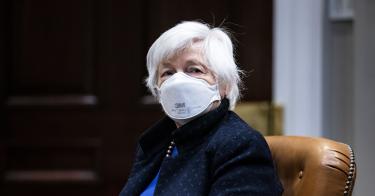Last week Treasury Secretary Janet Yellen outlined her department’s upcoming priorities. Anyone hoping that Treasury would start to narrowly focus on overseeing federal revenue and expenditures, with a sharp eye toward strengthening the nation’s credit, will be sorely disappointed.
Yellen did assure everyone that she is honored to “listen to the underrepresented,” but she most certainly was not referring to fans of limited government. Those poor souls will have to remain lost, wandering aimlessly while hoping against all hope that someone will one day inject a dose of humility or practicality into the federal beast.
On the other hand, anyone looking for federal bureaucrats to damn the torpedoes, ignore the historical record, and continue to try to solve all the world’s problems, should be downright ecstatic. It’s obvious that Yellen loves global bureaucracies, where mission creep seems to be built into their DNA.
She apparently hopes we’ll pay no attention to their history. According to Yellen, in the aftermath of WWII, “We created global institutions, such as the United Nations, and financial institutions, such as the International Monetary Fund and World Bank, to reduce economic conflict and address global poverty.”
>>> Janet Yellen Should Focus on Fiscal Policy, Not Environmental Activism
Neither the IMF nor the World Bank were created for such purposes.
The IMF was created to assist nations with balance of payments problems under the gold standard, a monetary system that officially ended in 1971. Did the IMF disband? Quite the opposite. The IMF expanded its mission, in the process becoming increasingly hostile toward American free enterprise. Yellen confirmed that the Biden administration will play along, even though it will put American taxpayers at even more risk. (The administration will support a plan long pushed by “progressives and the international left to massively increase the quantity of the International Monetary Fund’s special drawing rights (SDRs).”)
Similarly, The World Bank was created to help rebuild the European countries devastated in WWII. In less than a decade, though, its mission shifted, and it started funding infrastructure projects from Central America to Africa and beyond. By the 1970s, “poverty eradication” was the mission. That one, of course, is still a work in progress.
For anyone interested, there is more than enough evidence that these organizations have not successfully developed anything. Not that anyone in power is going to admit it.
Then, of course, there is climate change, the Secretary’s dearest cause, for which she wants to name a czar at Treasury. According to Yellen, “In the push to grow our economies, we neglected our environment.”
Assuming that “we” refers to Americans, the facts are not on Yellen’s side.
The U.S. created the Environmental Protection Agency in 1970, after two decades of escalating public debates regarding environmental concerns. Even if that might not have been the best way to help the environment, it is very difficult to call what happened neglect.
Separate from the public agencies involved, the record shows that U.S. greenhouse gas emissions were 13 percent lower in 2019 compared to 2005 levels. It also demonstrates a 30-year improvement in energy efficiency, one that has not been driven primarily by government mandates. For instance, the U.S. Energy Information Administration (EIA) reports that:
The decrease in U.S. energy intensity (energy/GDP) has been relatively consistent across the 30-year time frame, largely as a result of demand-side efficiency gains and economic trends, such as the changing profile of U.S. manufacturing industries as well as the shift to greater commercial sector economic activity.
Cleaner energy got a big boost from productivity gains in the natural gas industry, as pure of a pro-American free-enterprise story as one can find. As the EIA reports, “Increases in natural gas production from shale and tight resources that lowered the cost of natural gas production and made it cost competitive with coal for electric power generation.” (Strangely, there’s no talk in the Biden administration of expanding natural gas use.)
In fact, the entire world has been experiencing lower CO2 emissions per unit of economic output (GDP) for the past 60 years, suggesting that growing wealthier does not automatically lead to environmental destruction. Either way, it is pretty much the opposite of growing our economies while neglecting the environment.
But why would political leaders let basic facts like these stop them from doling out more money in the name of saving the planet? Especially when it’s other people’s money. Besides, what else would they do?
According to Janet Yellen, plenty.
>>> For Manchin, the Real Climate Change Has Just Begun
In addition to supporting all the standard progressive ideas for alleviating income inequality and the supposed hollowing out of the middle class in the U.S., Yellen is also calling for action to stave off global inequality. Unsurprisingly, Yellen is not suggesting that she and her IMF/World Bank compatriots give up their salaries and sell off their own assets. No, she simply wants to rely more on the IMF and the World Bank.
With no apparent hint of hypocrisy, she wants to further strengthen these two institutions to “help low-income countries address unsustainable debt burdens.”
This statement alone is worthy of a new South Park episode.
Well before the COVID-19 crisis, or even just the latest multi-trillion dollar spending plans, the long-term fiscal sustainability of the U.S. was, to say the least, in serious jeopardy. But the Biden administration is going to forget all of that, and promote profligate government spending throughout the entire world, in the name of solving economic and social problems everywhere.
Everyone is going to need a really good sense of humor for the foreseeable future.
This piece originally appeared in Forbes https://www.forbes.com/sites/norbertmichel/2021/04/12/yellens-priorities-a-win-for-overreach-a-loss-for-responsibility/?sh=74370ad216f8



